We are so happy to finally have some wines from Michel Guignier after a long break.
Michel farms a small property near the village of Vauxrenard in the Beaujolais with about 7 hectares under vine. When we first started to work with him in 2013 most of the wines were named with the appellation they came from. The majority – the wine from the home vineyards – was Beaujolais Villages by virtue of being in the Vauxrenard commune. But he also made a Moulin à Vent and Fleurie cuvée.
He still has land in Moulin à Vent, from which he makes two wines, with the rest coming from the vines on his property. Now, though, he labels all his wines as Vin de France. Like many of the other people whose wine we import, he decided that life was better not having to deal with the bureaucrats. While it’s sad in a way that, thanks to rigorous rules, the places his wines come from are no longer so easily identifiable we’re more than happy that Vin de France gives him a better life.
It has another advantage in Australia in helping work out whose wines are whose! There is more than one Michel Guignier making wine in the Beaujolais and both are imported into Australia. It helps that the other Michel Guignier, who also works organically but lives in Villié-Morgon, still appears to work entirely with appellated wines. So if you see a recent vintage of a Michel Guignier wine and it has an appellation other than Vin de France it’s the Villié-Morgon Michel Guignier. If it’s Vin de France it is almost certainly the Michel Guignier we work with who you can see here.
We think these photos emphasise Michel’s connection with his soils. They are literally ingrained into his very being.
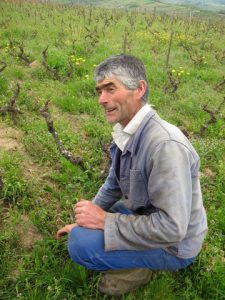
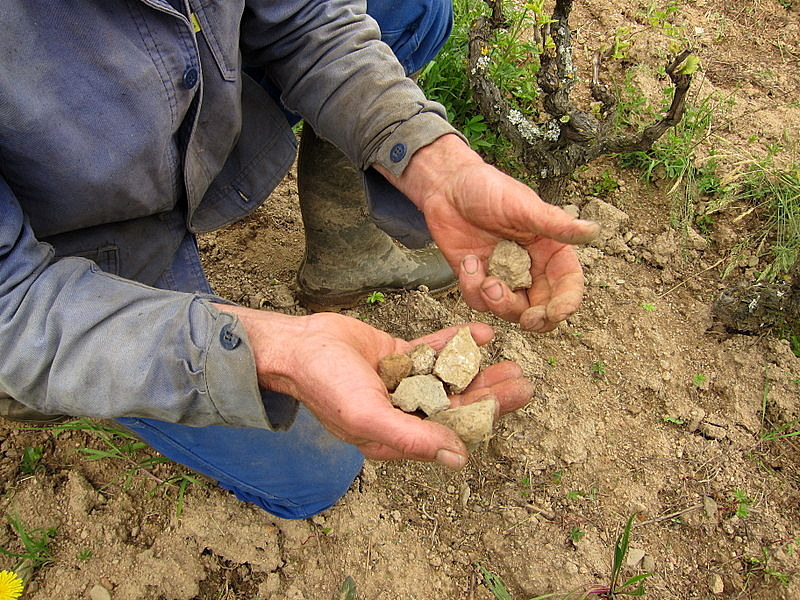
Michel believes passionately in biodiversity and soil quality and his vines are dotted through his farm which sits in the middle of the forests that surround the village of Vauxrenard.
In the photo below you can see Michel’s farm, its borders approximately identified with a red line. If you have ever visited the Beaujolais you know, as you can see in much of this photo, that large parts of it are a monoculture with wall-to-wall vines. In this photo Michel’s property is a small oasis surrounded by forest on all sides. To the south is Chiroubles and to the south-east is Fleurie.
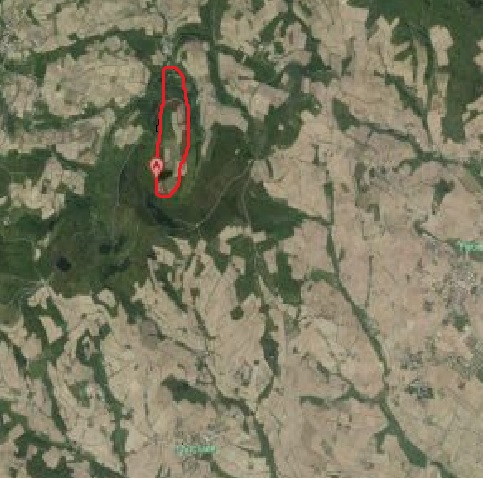
As well as vegetables and an orchard, including grains, Michel also farms beef cattle, which share grazing space with his draft horse Bistère, who he works with in the vines. He prepares all his own compost which helps to keep his soils full of life and energy, as do his biodynamic practices. He credits Christian Ducroux for pointing him in this direction which is quite different from the cultivation methods his father used.
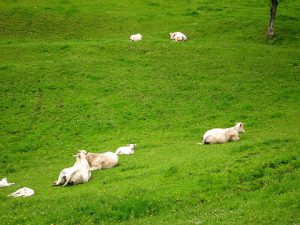
When we arrive at Michel’s the sense of reaching an oasis is not just about the physical greenery. It’s a sense of calm and permanence Michel eschews, unsurprising perhaps because this is the property where he and previous generations grew up.
The substantial farmhouse, with the cellar at one end, the equally substantial garden and orchard, and the animals make you feel like this is how it has been forever. It also feels totally self-contained, as if this would be a very good place to wait out any apocalypse.
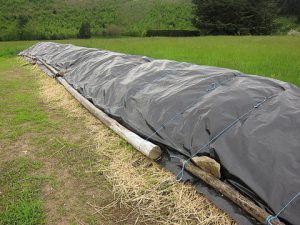
The feeling of arriving and being at Michel’s is described beautifully in much more detail by Bert Celce on his wineterroirs website after a visit he made a few years ago.
And we highly commend this beautiful map, drawn by Anna Hodgson, whose brother Raef is one of the faces of Gergovie Wines, Michel’s British importer. It shows all of the parcels which make up the home vineyards.
Ever since we have known Michel he has worked without additions – no added yeasts obviously but also no added sulphites and no filtration or fining. The wines are a complete expression of these soils and microclimate with no manipulation.
He also takes his time before deciding to release each cuvée, as you can see from the dates of the vintages of some of these wines. It was originally something of a surprise to us when we found this gentle, humble farmer making some of the most exciting natural wines in the Beaujolais. It is not the way he originally worked though – with the wine or the vineyard – but his journey has been a remarkable one which we are very happy to play a part in.
We love a story he told us some years ago. Both he and his brother inherited vines from their father. Michel’s brother continued to work with chemicals, including herbicides. The vines are quite close to one another. As the grapes ripen it’s Michel who has problems with the birds not his brother. They know where the best tasting grapes are!
If there’s one characteristic that defines all the wines it’s their bright acidity. Even the older wines, like the 2015 Au Bon Grès, have a freshness that belies their age. They don’t really get old. To appreciate that freshness and life these wines need to be drunk in one sitting though. We wouldn’t recommend holding them overnight.
These older cuvées which Michel has held back before releasing (like Au Bon Grès and Moncailleux) can also be aged even further should you wish. One of the most enjoyable wines we have drunk so far this year was a cuvée of Michel’s called Les Grumeaux, which was predominantly from the 2006 vintage (blended with a small amount of wine from 2004 as well).
To see which wines are currently available click here “Buy Natural Wines“.
Michel Guignier Vin de France Mystère de Rosée 2021
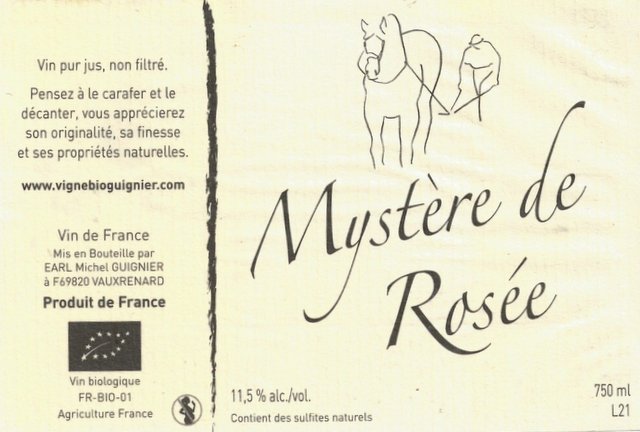
Michel produces an extraordinary rosé which is light, vibrant and lively. This is released under the Vin de France appellation. The vines from which this wine is made are over 30 years old.
To make Mystère de Rosée Michel macerated the grapes for 12 hours and then pressed very slowly for 12 hours. The juice was then fermented and aged in foudre. It is so bright and the flavours, including the juice of pomegranate and red fruits, are lingering.
Fermentation and elevage takes place in large oak foudres.
The wine has a great depth of flavour despite the light touch. It is also perfect for summer day time drinking at only 11.5% alcohol.
The label shows Michel working in the vineyards with his trusty horse Bistere.
RRP: $56
Michel Guignier Vin de France La Bonne Pioche 2020
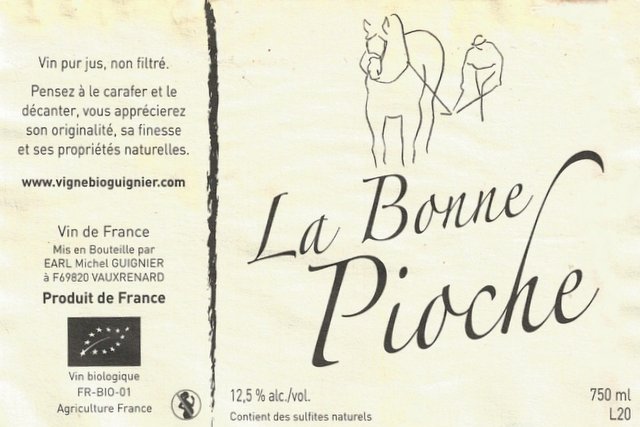
The vines for La Bonne Pioche are from a parcel within Michel’s farm, quite close to his house. When it was appellated it was classified as Beaujolais Villages, an appellation that covers vines grown in 38 communes, including Vauxrenard, where Michel’s farm is located.
The soil on this area is mainly friable granite and Michel also has degraded sandstone (Grès).
This wine had 10 days of semi-carbonic maceration in stainless steel then spent 10 months in a foudre before bottling in July 2021. As with all the wines, its acidity ensures freshness and the viticulture and vinification provide the life.
RRP: $56
Michel Guignier Vin de France La Petite Oseille 2020
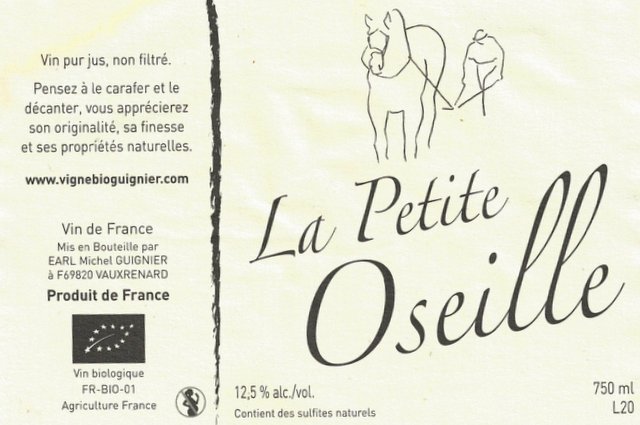
We love Moulin à Vent wines for their structure and their minerality and nervy energy derived from the decayed granitic soils.
Michel no longer uses the appellation for any of his wines, but the grapes for this wine are still harvested from his plot in the Moulin a Vent but he uses the more general Vin de France appellation (which you can see in small print on the left side of the label).
Vinified the same way as Le Bonne Pioche, it had 10 days of semi-carbonic maceration in stainless steel then spent 10 months in a foudre before bottling. It has a little more complexity than La Bonne Pioche, a little spiciness, and a very pleasing light touch of reduction.
12.5% alcohol.
RRP: $68
Michel Guignier Vin de France Granite 2020
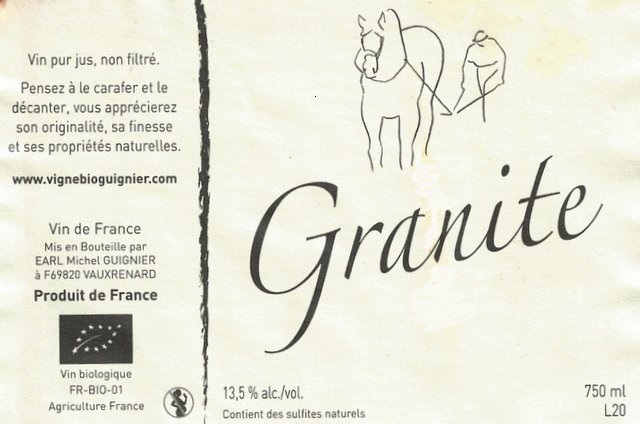
The Granite is made from grapes grown in the beautiful vineyards near Michel’s house which is on a hill outside Vauxrenard. This is from another home parcel just a few minutes walk beyond the cellar which could be Beaujolais Villages had Michel chosen to submit it to the relevant authorities, however, like all his other wines he is happy to remain outside the appellation processes.
This cuvée is slightly more savoury than the other two 2020 wines and the aromas and flavours more darker berries and lusher but it has the same fresh acidity and perhaps even more energy on opening, finishing with just a touch of volatile acidity. It is also more powerful with 13.5% ABV.
RRP: $63
Michel Guignier Vin de France Le Moncailleux 2017
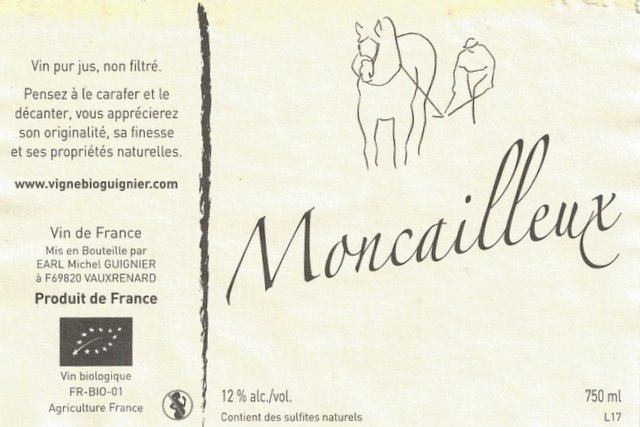
The vines in the Moncailleux vineyard are over 70 years old and grow in the Moulin a Vent appellation although Michel prefers to label it as a Vin de France.
This wine was fermented in concrete tanks lined with epoxy resin using whole bunches of grapes and, after pressing, transferred to large, old wooden barrels of between 20 hectolitres and 37 hectolitres in capacity.
The wine appears incredibly light at first sip, but gradually the power, structure and concentration of the fruit begins to impact. A delicious and memorable wine at 12% alcohol.
As you can see, Michel will not release his wines until he thinks they are ready to drink and this one is no exception being almost 6 years old!
RRP: $77 (SOLD OUT)
Michel Guignier Vin de France Au Bon Grès 2015
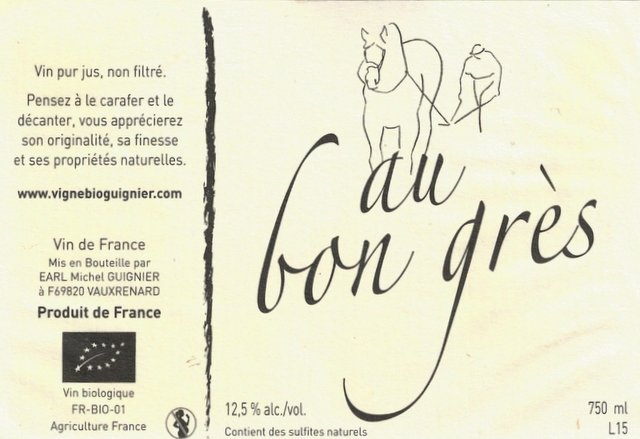
This delightful wine was made from grapes grown in soils of friable granite and degraded sandstone. The vineyard lies between the parcels of Granite and La Bonne Pioche on Michel’s farm.
After semi-carbonic maceration in concrete vats this cuvée had two years in foudre and then extended aging in bottle before release, for which we are grateful.
It has great structure, depth and complexity without having sacrificed its life. The tannins have had plenty of time to integrate and create a beautifully balanced wine. It’s a great example of how wines without added sulphites can age well if they are kept in good conditions.
Note that before 2015 Michel rented a plot in Fleurie and the wine he made from there was called Au Bon Grès. So some of the older vintages of Au Bon Grès are labelled with the Fleurie appellation. After he gave up the rented land in 2014 he has continued to use the cuvée name Au Bon Grès (which literally translates as “the good sandstone”) for the wine he now makes from his own property. The soils are similar to the soils in the Fleurie plot and the vinification and aging regime are the same. 12.5% ABV.
RRP: $70 (SOLD OUT)
Michel Guignier Vin de France Les Grumeaux
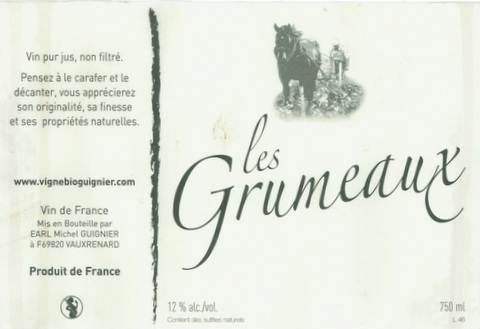
This fascinating wine is a blend of two older vintages (2004 and 2006). We love this wine because it demonstrates the lasting qualities of Michel’s products.
Because it is a blend of different vintages it cannot carry the appellation on the label therefore it is classified as a Vin de France. The label for this wine shows his faithful horse, Bisterre, who plows the vineyards with Michel.
Each of the wines were fermented in concrete tanks lined with epoxy resin using whole bunches of grapes and, after pressing, transferred to large, old wooden barrels of between 20 hectolitres and 37 hectolitres in capacity.
12% alcohol
RRP: $52 (SOLD OUT)






















